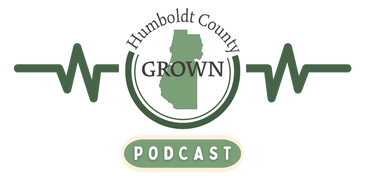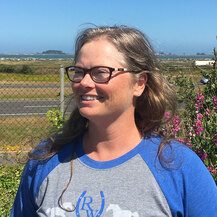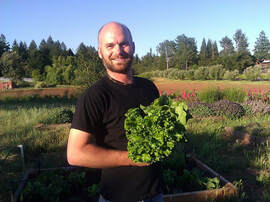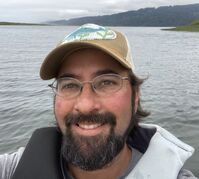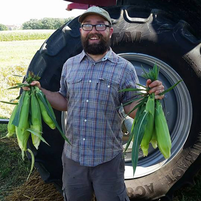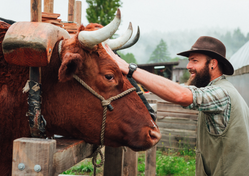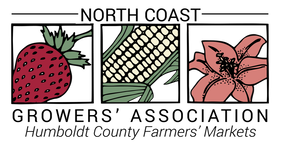THE CLIMATE RESILIENT
- The application period for the second cohort is now closed -
College of the Redwoods and the North Coast Growers’ Association are excited to provide the Climate Resilient Farmer Training Program, providing long term and sustainable strategies for climate resilience and adaptations. Graduates will earn a certificate from College of the Redwoods in Climate Resilient Farming.
Curriculum is designed for participants from Humboldt and DelNorte Counties who are in their first 5 years of farming and prioritizes spaces for socially disadvantaged farmers and farmworkers.
Curriculum is designed for participants from Humboldt and DelNorte Counties who are in their first 5 years of farming and prioritizes spaces for socially disadvantaged farmers and farmworkers.
Participants will complete two sessions of workshops in the program, focused on climate resilient practices such as reduced water use, seed saving practices, carbon farming practices, and tools and infrastructure to create a resilient farmer for our local community. The winter session will be held at College of the Redwoods main campus. The summer session will be held over two days at the College of the Redwoods Shively Farm, a certified organic diversified farm nestled in the floodplain of the Eel River.
Instructors and presenters will be from multiple local agriculture entities, including the UC extension office, College of the Redwoods, the Organic Seed Alliance, Humboldt County RCD, Point Blue, and more. Experienced farmers will also be involved to provide real world experience and expertise to participants. Completers of the program will receive a certificate from College of the Redwoods in Climate Resilience Farming, and will also leave the program with a Climate Resiliency Plan that can be applicable to each participant's farm and situation.
Welcome to the brand new Humboldt Grown Podcast, created to connect local farmers to timely resources, discuss key issues, and better connect us all together.
**First Episode Now Available & Features the Climate Resilient Farmer Training Program**
Ivy North of NCGA talks with Silas Sarvinski, Farm Manager at College of the Redwoods, to talk about climate-related farming challenges in Humboldt and Del Norte, and some highlights from the upcoming Climate Resilient Farmer Training Program.
**First Episode Now Available & Features the Climate Resilient Farmer Training Program**
Ivy North of NCGA talks with Silas Sarvinski, Farm Manager at College of the Redwoods, to talk about climate-related farming challenges in Humboldt and Del Norte, and some highlights from the upcoming Climate Resilient Farmer Training Program.
The entire program will be offered twice, in two cohorts.
Each cohort will have both Summer and Winter sessions
for a total of 5 full workshop days.
Each cohort will have both Summer and Winter sessions
for a total of 5 full workshop days.
FIRST COHORT20 Spaces Available
Program Dates
Application Deadline
|
SECOND COHORT20 spaces available
Program Dates
Application Deadline
|
The summer sessions consist of 2 full days at the CR Farm in Shively, Ca Cohort 1 attended these session in June and July of 2023. Cohort 2 will attend these sessions in June or July of 2024. Sessions are held within 2-3 days and include: Tools/Infrastructure for the Resilient Farmer Presenter: Robert Landry, College of the Redwoods Weather, pests, and drought can all provide challenges in farming. From hand tools to high tunnels, this workshop will provide an overview of the practices and materials needed to stay resilient in an ever changing climate. Participants will learn what tools and infrastructure can aid in defending crops against the weather and pests, and how to strengthen their soils to prepare for the future. Irrigation Practices for Reduced Water Use Presenter: Eddie Tanner, UC Cooperative Extension Good yields with less water? Learn about strategies for reducing water use, including dry farming, drip irrigation, and improved sprinkler efficiency. On-farm examples will be provided to participants for hands-on experience covering a range of options for each of these irrigation systems. Seed Saving Practices Presenter: Jared Zystro, Organic Seed Alliance Jared Zystro from the Organic Seed Alliance will lead this workshop on seed saving practices. Topics covered will include: the potential benefits to saving seed on your farm, specific crops and varieties suitable for saving, managing the size and distance between seed crops to maintain the quality of your varieties, seed harvest and processing techniques, and the drying and storage of seeds. Reduced & No-Till Vegetable Crops without Herbicides Presenter: Eddie Tanner, UC Cooperative Extension Reduced tillage and no-till practices can result in soils with better structure and diverse microbial communities that are better at handling climate stresses. How are these techniques implemented in a commercial vegetable operation without herbicides? This workshop will review various methods used at multiple scales and the associated challenges. Learn some of the tools and practices used for cover crop termination, managing crop residues, bed preparation, and more. |
|
Featured Instructors
Kate Howard, Rangeland Watershed Initiative Partner Biologist
|
As a Partner Biologist I work in my local Natural Resources Conservation Service (NRCS) office here in Eureka. While most of my work is in Humboldt County, I do dabble in Del Norte and Mendocino counties as well. The NRCS provides technical and financial assistance to agricultural producers, and as the Partner Biologist I help inform and plan for wildlife-friendly practices. The land uses I work with include a variety of operations from dairy and beef cattle to small farmer’s market producers, forestry, and wetland easements.
I went to Humboldt State University for my B.S. where I learned to band (and subsequently love) birds at Humboldt Bay Bird Observatory. I have worked on coffee farms in Jamaica, cherry orchards in Michigan, and I did my M.S. through Tarleton State University (TX) looking at Black-shouldered Kites in sugarcane fields of Swaziland as part of ecologically-based pest management. I spent my first three years as a Partner Biologist in the Yuba-Sutter community in the Sacramento Valley and am now happily back on the North Coast. I have a deep passion for working in agricultural systems and am proud to work with both Point Blue and the NRCS to improve wildlife habitat in agriculture landscapes. |
Robert Landry, College of the Redwoods
|
Meet Robert Landry, the new full-time faculty member serving the Agriculture Program at College of the Redwoods. Robert comes to CR from Butte College where he taught in the Ag Program for the past 8 years. Prior to that, he coordinated the Sustainable Agriculture Program at Santa Rosa Junior College and taught a wide range of classes related to agriculture science, farm management and production practices.
After getting involved in the local food movement in Austin Texas farming pecans and working farmer’s markets while studying Biology as an undergrad, Robert realized he wanted to go back to school to learn more of the science of growing food. He soon found his way to California to attend graduate school at UC Davis studying crop science. Since moving out to California over a decade ago, Robert has been involved with the local food scene and has worked with many farmers in production as well as selling produce and value-added products at numerous farmer’s markets in the Bay area. While a graduate student, he realized how much he enjoyed teaching, and thus embarked on his career as an Ag Science teacher. |
Eddie Tanner, UC Cooperative Extension
|
Eddie has been involved in agriculture in Humboldt County for more than 20 years as both a farmer and a farm & garden educator. In his role with UCCE, he will be supporting the region’s vegetable, fruit, flower, and nursery growers with research-based technical assistance, collaborating with community partners to increase access to locally produced foods, and supporting the UC Master Gardeners who extend horticultural expertise throughout the community.
Eddie’s journey in agriculture began with an apprenticeship at Live Power Farm in Covelo, California, where he learned about community supported agriculture (CSA), Biodynamics, and farming with draft animals. This led him to management roles at the Arcata Educational Farm and the United Indian Health Services Potawot Garden. He founded his own farm business, Deepseeded Farm, in Arcata in 2008, which he still operates. His connection to farming guided his studies, and he received a B.S. in Wildland Soil Science from Humboldt State University and later a M.S. in Agriculture from Washington State University, where he researched winter lettuce production in high tunnels (unheated greenhouses). Eddie has also been engaged in farm & garden education; leading classes, workshops, and farm tours, and authoring a local garden handbook, “The Humboldt Kitchen Gardener.” |
Jared Zystro, Organic Seed Alliance
|
Jared Zystro is Organic Seed Alliance’s Co-Director of Research and Education. He lives in Arcata and graduated from Cal Poly Humboldt with a degree in biology and a minor in botany. Over the years he has worked on local farms including DeepSeeded Farm and the Bayside Park Farm. He has a Ph.D. in plant breeding and plant genetics from the University of Wisconsin - Madison, where he studied efficient methods of developing new organic vegetable varieties. Jared has worked in the organic seed industry for over 15 years, managing seed production at two farms and conducting research and education projects with OSA. He co-manages OSA’s research and education program, conducts participatory breeding projects and variety trials, and teaches farmers about seed production and plant breeding at workshops, conferences, and field days. Organic Seed Alliance is a national organization that works through research, education and advocacy to ensure an abundant and diverse supply of ecologically grown seed, tended in perpetuity by skilled and diverse communities of seed stewards.
|
Featured Farmer Guests Include
Applications will be reviewed by a committee that will include staff members from NCGA, DNATL, UCCE and other organizations. Prioritization will be given to applicants who are within their first 5 years of farming and have at least 1 year of experience (as a farm worker, manager or owner), as the curriculum will be developed for newer farmers. Farm workers who have at least 1 year of experience are also encouraged to apply. Farmers or farmworkers with more experience are welcome to apply with the understanding that the curriculum is designed for newer farmers and newer farmers will be prioritized. Additionally, priority will be given to farmers who identify with one or more of of the qualifying categories of social disadvantage which include:
Applicants who identify with multiple categories of disadvantage will be given the highest priority. Applicants who fall outside of the above listed priority groups may also be considered if all spaces are not filled with farmers that have identified with the above categories.
- Having a farm (or working on) a farm or residence in a remote location
- Within your first 10 years of business
- Having a farm that is women owned (more than 50%),
- Having a farm that is queer owned OR:
- Identify as any group that the USDA defines as “socially disadvantaged farmers and ranchers (SDFRs)“, as those belonging to these groups have been most likely to have been subject to racial or ethnic prejudice. SDFRs include farmers who are: Black or African American, American Indian or Alaska Native, Hispanic or Latino, and Asian or Pacific Islander
Applicants who identify with multiple categories of disadvantage will be given the highest priority. Applicants who fall outside of the above listed priority groups may also be considered if all spaces are not filled with farmers that have identified with the above categories.
This program is provided at no cost to all participants,
thanks to generous grant funding!
Stipends of $500 each will be available to the applicants in each of the two cohorts (for a total of 40 stipends of $500). The stipends will be offered to approved applicants who identify with one or more of the above categories of social disadvantage. Confirmation of stipend awards will be communicated to applicants when/if their application is approved. Stipends are intended to help offset the travel costs and loss of wages or work hours for time spend in the program.
thanks to generous grant funding!
Stipends of $500 each will be available to the applicants in each of the two cohorts (for a total of 40 stipends of $500). The stipends will be offered to approved applicants who identify with one or more of the above categories of social disadvantage. Confirmation of stipend awards will be communicated to applicants when/if their application is approved. Stipends are intended to help offset the travel costs and loss of wages or work hours for time spend in the program.
For application questions:
Ivy North
Agricultural Programs Director, NCGA
[email protected]
C: (707) 599-1651
northcoastgrowersassociation.org/agprograms
NCGA Voicemail: (707) 441-9999
For program content questions:
Silas Sarvinski
Farm Manager, Agriculture Production Manager, College of the Redwoods
s[email protected]
C: (707) 599-1338
Ivy North
Agricultural Programs Director, NCGA
[email protected]
C: (707) 599-1651
northcoastgrowersassociation.org/agprograms
NCGA Voicemail: (707) 441-9999
For program content questions:
Silas Sarvinski
Farm Manager, Agriculture Production Manager, College of the Redwoods
s[email protected]
C: (707) 599-1338

